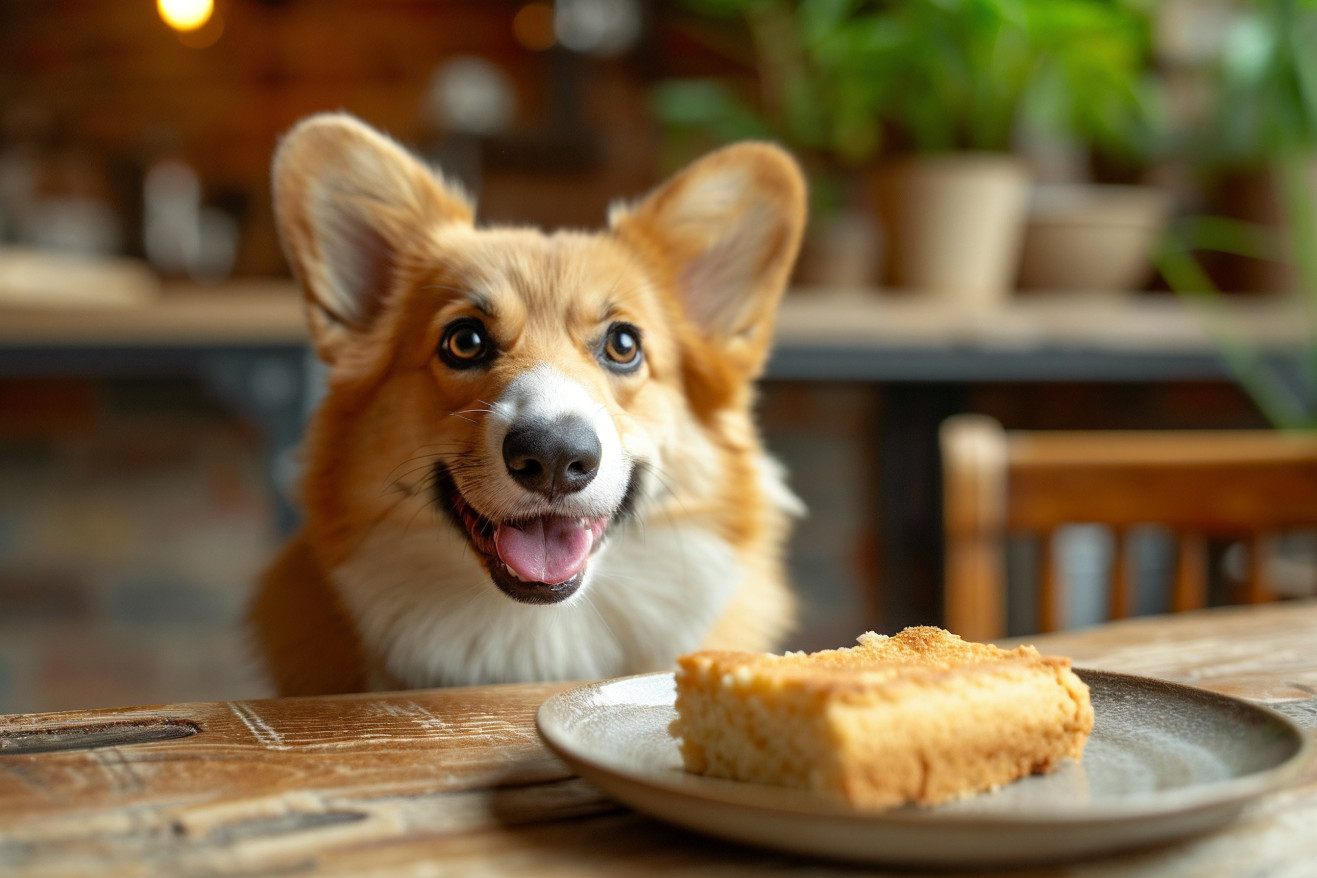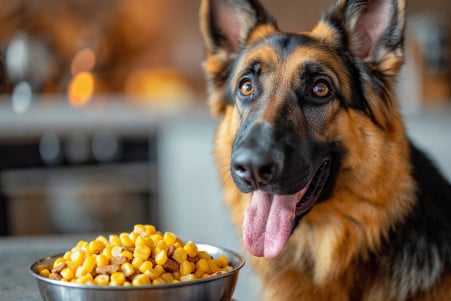Can Dogs Eat Cornbread? A Guide to Canine-Friendly Treats
4 February 2024

Cornbread is a delicious and comforting human food, but can you share it with your furry friend? While cornbread is safe for dogs to eat in small amounts and isn’t toxic, it doesn’t have much nutritional value.
Because of this, you should limit how much you give your dog to eat, especially if you want to avoid weight gain and potential allergies. If your dog has dietary restrictions or health problems, you should talk to your vet.
This article will take a deep dive into veterinary opinions and nutritional research to explain the role of grain-based treats, like cornbread, in a dog’s diet. We’ll discuss the potential health risks of cornbread, look at its nutritional value, and talk about how dogs digest grains. This information will help you make the best choices for your pet, so you can feel confident that every treat you give them is contributing to their health.
Can dogs eat cornbread?
Meeting Your Dog’s Nutritional Requirements
A healthy, balanced diet is the foundation of good health for your dog. The VCA Animal Hospital explains that dogs need a mix of proteins, fats, carbohydrates, vitamins, and minerals to meet their nutritional needs. Water is also a critical part of their diet. While treats like cornbread don’t meet these requirements, they can be a fun addition to your dog’s diet when used in moderation.
Because high-quality dog food meets most of your dog’s nutritional needs, the nutritional value of cornbread to dogs is likely to be low. The VCA Animal Hospitals recommend dog foods that contain whole-food ingredients and meet the nutritional standards set by the Association of American Feed Control Officials (AAFCO).
Treats, including cornbread, should be just that—treats. If given too often, they can lead to weight gain and disrupt the balance of your dog’s diet. The Canadian Academy of Veterinary Nutrition explains that while grains like corn are nutritious, they should only make up a small part of a dog’s diet.
If you do give your dog treats like cornbread, make sure to give them in moderation. This will help ensure that they’re a healthy and fun part of your dog’s diet, rather than a disruption to their nutritional needs.
Cornbread and Canine Health: Benefits and Risks
If you’re thinking about giving your dog cornbread, it’s important to know what’s in it. Cornbread is made up of a combination of carbohydrates, protein, and fat. Hepper explains that it also contains magnesium and iron, which help with nerve function and the formation of hemoglobin, while Facts.net says that it can help with a dog’s B vitamin intake, which is important for energy and brain function.
However, because the carbs are mostly fast-acting and have a moderate to high glycemic index, it’s important to make sure you’re not giving your dog too much.
In addition to the potential for digestive help due to the fiber it contains, as Hepper explains, there are also potential risks to consider. In addition to the potential for weight gain due to the high number of calories, HealthifyMe points out that there are potential health risks associated with corn allergies. Hepper says that this can lead to digestive and skin issues.
Make sure to introduce cornbread to your dog’s diet slowly and make sure to take into account any health issues or allergies that they may have.
In general, it’s probably safe to give your dog a small amount of cornbread every once in a while, but make sure that you’re making it at home so that you can avoid adding in extra sugar and unhealthy fats.
Make sure to balance out the glycemic load of the cornbread by giving it to your dog with high-protein or high-fiber foods so that you can make sure that your dog is able to enjoy it without any negative health effects.
Coping with Corn Allergies in Dogs
Although food allergies are less common in dogs than other types of allergies, corn is one of the ingredients that can cause an allergic reaction. According to the VetDERM Clinic, clinical signs of food allergy in dogs can include skin disease, gastrointestinal disease, and ear infections. These clinical signs can be the result of an immune system response to certain proteins in the dog’s diet.
One study published in BMC Veterinary Research even found that cornstarch is less allergenic than corn flour in dogs that are allergic to corn. This is important to note when considering giving your dog cornbread as a treat because the level of allergenicity can depend on the type of corn product. The researchers concluded that dogs with corn allergies may be more tolerant of cornstarch because it has a lower protein content.
If you suspect that your dog is allergic to corn, and you notice symptoms of an allergic reaction, such as itching or gastrointestinal issues, after feeding them cornbread, it’s important to talk to your vet. They may recommend an elimination diet, which is described in a study published on PubMed, to identify the allergen.
In general, managing a dog’s corn allergy will require avoiding the allergen and making dietary changes to ensure the dog’s needs are met.
Grains and Your Dog’s Diet
Grains are one of the most misunderstood components of dog nutrition. As the American Kennel Club points out, dogs have evolved from wolves to be able to digest starch. When properly processed, grains like corn can offer dogs digestible carbohydrates, essential fatty acids, and valuable fiber, which can be especially helpful for dogs with certain dietary issues.
The grain-free diet trend that emerged as a result of human dietary changes has been linked to canine dilated cardiomyopathy (DCM) by the American Kennel Club and investigated by the FDA. This link shows that it’s important to be thoughtful about the grains that you include in your dog’s diet and make sure that it’s well-balanced and tailored to their specific health needs.
Cornbread, as a grain-based treat, can be a part of a well-rounded diet if dogs like it and don’t have any negative reactions to it.
However, it’s always important to work with a veterinarian to make sure that you’re feeding your dog the right food, whether it includes grains or not, based on their individual nutritional and health needs. As pet parents make this decision, the goal should always be to choose the diet that will best help their dog thrive.
Can You Give Your Dog Cornbread?
So, can dogs eat cornbread? While cornbread is safe for dogs to eat in small amounts, it’s important to remember that it’s not a healthy food for dogs. Cornbread is high in sugar and low in essential nutrients, which means it can lead to weight gain, diabetes, and inflammation if your dog eats too much of it.
That said, if you want to give your dog a small piece of cornbread as a special treat, it’s unlikely to cause any health problems. Just make sure to monitor your dog for any signs of an allergic reaction or digestive upset, especially if it’s their first time eating cornbread.
It’s also important to remember that some dogs have special dietary needs that make it unsafe for them to eat cornbread. For example, if your dog has diabetes, the sugar in cornbread can cause their blood sugar levels to spike. Similarly, if your dog has a gluten sensitivity, the wheat in cornbread can cause an allergic reaction.
If you have any concerns about whether or not it’s safe for your dog to eat cornbread, make sure to talk to your vet. They can help you understand your dog’s dietary needs and make sure you’re feeding them a healthy, well-balanced diet.


